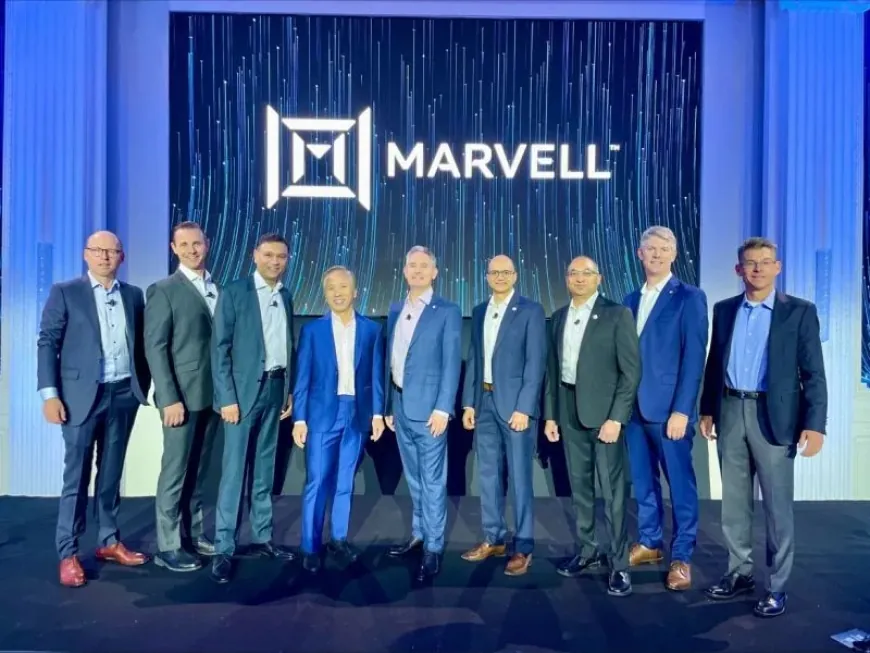Marvell Plans Hiring Increase and Added Chip Design Work in India
Marvell Technology plans to add more engineers in India and expand chip-design and data-center hardware projects at its Bengaluru, Hyderabad and Pune centers over the next three years.

U.S. chip designer Marvell Technology plans to increase hiring and strengthen its engineering presence in India over the next few years, as global demand rises for servers, networking equipment, and storage systems that support artificial intelligence. The company outlined its plans in an interview with Reuters, describing India as a key location for future design and development work.
Marvell has been active in India for many years and currently employs around 1,700 engineers across three cities. According to Navin Bishnoi, who leads the company’s operations in the country, Marvell intends to increase that number by about 15% each year for the next three years. While he did not provide details on the size of the increased research budget, he said the company will assign more technical programs to its India teams.
The hiring plan comes during a period when companies worldwide are building more data centers to support AI training and inference. These systems rely on advanced chips for networking, storage, data movement, and security — areas in which Marvell specializes.
How Marvell Uses Its India Teams
Marvell operates three main centers in India, each with a specific set of responsibilities:
Bengaluru (India Headquarters)
This is the company’s largest India facility. Engineers here work on chip design, hardware validation, system software, and product integration. Projects handled in Bengaluru often involve long-term development cycles and cross-team coordination with Marvell groups in the U.S. and Asia.
Hyderabad (Security Engineering)
The Hyderabad office focuses on security solutions for servers and data centers. This includes encryption modules, data protection features, secure boot systems, and internal tools that help cloud providers maintain hardware reliability and safeguard information.
Pune (Embedded Development)
The Pune team works on embedded software and firmware used in networking and storage hardware. This includes routing technologies, storage controllers, NIC firmware, and link-level performance tuning — essential components for large AI data center setups.
Bishnoi said India’s teams have grown in technical depth over the years, and more product categories are now handled locally. He added that Marvell expects India engineers to take on a larger share of design work for chips used in AI servers and high-speed network systems.
Why India Has Become More Important for Marvell
Although India currently contributes a small portion of Marvell’s total revenue, Bishnoi said this is likely to change as:
-
more global cloud companies build data centers in India,
-
local enterprises adopt AI hardware for internal workloads,
-
new data protection rules require storage and processing within the country, and
-
Indian companies modernize their networks for higher throughput.
“India has become one of the top regions for new data center capacity,” Bishnoi said. He added that Marvell is currently in discussions with global cloud providers and several Indian companies to supply hardware for new AI-related projects.
Growing interest in AI tools, along with the need for reliable data movement and storage, has increased demand for chips that support high bandwidth and low latency. Marvell provides components used in switches, optical modules, servers, and security appliances — all of which are required in AI data centers.
Interaction With Local OSAT Providers
Marvell is a fabless semiconductor company. It designs chips internally but uses external foundries, assembly firms, and testing companies for manufacturing.
Bishnoi said Marvell is speaking with several Indian OSAT providers (outsourced semiconductor assembly and test companies) about future cooperation. These firms package and test chips after fabrication, a crucial step that affects performance, reliability, and time-to-market.
India has seen new OSAT projects announced under government financial programs. While these facilities are still in early stages, Marvell wants to understand how it can work with such companies once they begin full operations. Bishnoi said the talks are intended to align long-term plans rather than establish immediate manufacturing activity in the country.
India’s Semiconductor Ambitions and Marvell’s Position
India has announced a $10 billion program to encourage semiconductor production, with a focus on assembly, testing, design centers, and eventual fabrication. Several OSAT facilities and joint ventures are already under construction or undergoing approval.
Although India does not yet have a large-scale fabrication plant, the government wants to build domestic capacity for chip packaging and testing, which are essential for AI and data-center hardware.
Marvell’s engineering presence aligns with these developments because:
-
its India teams already contribute to advanced chip design,
-
local OSAT firms will eventually need design collaboration,
-
more data centers in India require locally optimized networking hardware, and
-
the country is becoming a preferred location for hardware design talent.
Bishnoi said India may not be one of Marvell’s fastest-growing revenue markets within the next five years. However, he expects India’s long-term prospects to be strong, particularly as domestic companies increase hardware spending.
“Ten years from now, yes,” he said, referring to India’s potential to become a larger source of revenue.
AI Growth Has Created New Opportunities for Marvell
AI training and inference require very high bandwidth between servers, GPUs, and storage. This has increased demand for:
-
optical modules,
-
high-speed Ethernet chips,
-
storage acceleration products,
-
data center security systems, and
-
embedded controllers that manage internal traffic.
Bishnoi said Marvell’s India teams are involved in these areas and will take on more work as the company expands. He noted that India’s engineers have contributed to products used in recent AI server generations and that additional work will be assigned to India as staffing grows.
Hiring Plans and Talent Availability
Marvell plans to add new engineers gradually rather than through rapid hiring, according to Bishnoi.
He said India continues to offer a strong talent pipeline, especially in chip design, embedded systems, high-speed networking, and firmware — fields that match Marvell’s product lines.
Hiring will be distributed between the company’s three main centers, with Bengaluru receiving the largest share due to its existing scale and the availability of senior engineers.
Also Read: Adobe to Acquire Semrush for $1.9 Billion in Cash































































